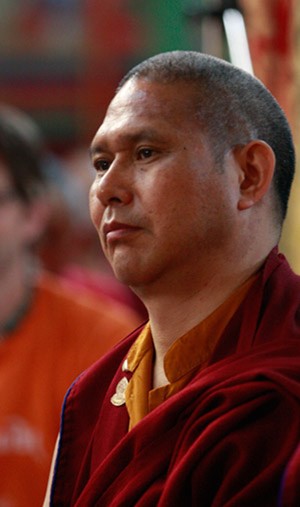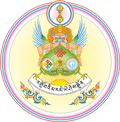Khenpo Karma Tashi

Ven. Khenpo Karma Tashi was born on 18th July, 1966 in Tinki VDC, Manang, Nepal. He entered Thrangu Tashi Choling Monastery in Boudha, Kathmandu, Nepal and became a monk at the age of twelve. After entering the monastery, Khenpo began his monastic education in Tibetan studies of the scriptures and Buddhist rituals.
In 1981, Khenpo went to Karma Shri Nalanda Institute for higher Buddhist studies at Rumtek in Sikkim, India. For the next ten years, Khenpo studied the five major Buddhist texts of Sutra at the Institute namely: Madhyamika Philosophy; the Prajna Paramita Sutras; the Abhidharma Gosh; the Vinaya; and the Dialectics and Logic, as well as advanced levels of Tibetan grammar and composition, and Buddhist debate practices.
After completing the ten-year course of Higher Buddhist studies, he was given the title of “Khenpo”. This title is given as a master’s degree in Buddhist Philosophy, similar to a PhD. in Theology.
As Khenpo Tashi was skilled in both Buddhist philosophy and meditation, Thrangu Rinpoche appointed him as the main Khenpo/Teacher for the two monastic colleges: Namo Buddha Institute at Namo Buddha, Nepal where he taught for nine years; and Vajra Vidya Institute in Sarnath, Varanasi, U.P. India where he taught for four years.
In 2004, Khenpo entered the traditional three-year retreat at Thrangu Sekar Retreat Center in Bhaktapur, Nepal, remaining for an extra two years and eventually completing retreat in 2009.
The traditional three-year retreat is divided into two parts: preliminary practice and the actual practice. The preliminary practice includes going for refuge, which is recited along with one-hundred thousand prostrations; the practice of Vajrasattva, to pacify negative karma from the past and present afflictions; the practice of Mandala, to increase the accumulation of merits that create conducive conditions for experience and realization to arise in one’s mind stream; and the practice of Guru Yoga, to receive blessings from the Lama/Master. Also in this part of the retreat are further Guru Yoga practices, including those for Kagyupa’s most important masters: Marpa, Milarepa, Gampopa and Karma Pakshi, the second Karmapa, as well as the practice of Mind-training, to give rise to the motivation for Bodhicitta, loving kindness and compassion.
The actual practice section of the retreat focusses on the great classes of Tantra, with general practice of the generation stages of the Yidam deity, and especially the practices which Lord Marpa Lotsawa received from Naropa, i.e. Chakrasamvara and Vajrayogini. There are also important deity practices like the Red Chenrezik, Amitabha and White Tara. The generation stage is brought to perfection based on the accomplishment of the outer, inner and secret practices. The completion stage is practiced based on the profound path of method, including the practices of Nadi, Prana and Bindu found within the Six Yogas of Naropa. After having been introduced directly to the nature of the mind itself, one practices Mahamudra.
The reason it is so important to do this retreat is to ensure that the lineage does not in any way deteriorate and in particular, so that the blessings within the lineage remain unbroken. In three years, the very best retreatants fully accomplish the practices, average practitioners attain qualities, such as the signs of heat, while the lowest ones without error enter the gateway to the path that leads to liberation and omniscience. In these ways, the retreats are endowed with many special benefits.
Having completed the traditional retreat, Khenchen Thrangu Rinpoche appointed Khenpo Tashi as a Teacher of Thrangu Monastery in Vancouver, Canada in 2010 where he lived for two years. Khenpo has also taught Buddhism to Westerners and in the past travelled to many countries with Thrangu Rinpoche.
In early 2013, Rinpoche appointed him the general manager, head abbot of Vajra Vidya Institute.

